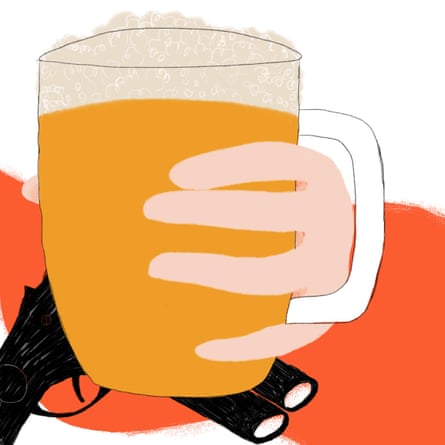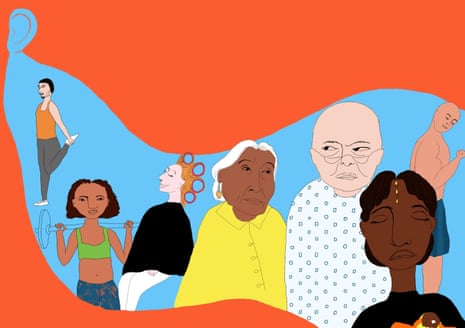‘I pulled over and we both just sat and sobbed together’
Sacha, black-cab driver, 50
Most conversations I have in my black cab are very simple: how’s your day, how’s the weather, how’s the traffic, that sort of thing. But occasionally I’ll have an interaction that stays with me. The most memorable one was on 26 September 2006, which happens to be my birthday. A young woman in her late 20s got in. When I asked how her day had been, she burst into tears. She told me that her baby had died in the womb, and she was trying to start a charity to help parents who experience stillbirths. I told her that it was my first day back at work, because my wife had just miscarried our twins. I pulled over and we both just sat and sobbed together. The resulting conversation helped me during a very difficult time. I’m not an emotional person, but that took me by surprise.
It’s not unusual for cab drivers to have very honest conversations, because people know they are not going to see us again. Passengers treat me like a temporary psychotherapist at times. They have told me about trust issues in their marriages, failing business relationships, anxiety. I keep driving and keep listening.
I’ll admit that after the Brexit vote, conversations have changed. I’ve got a shaved head, so people often presume I’m far right, when I couldn’t be farther to the left. The racist conversations I’ve had to endure have been vile.
I overhear a lot of conversations, whether they’re about business, relationships or sex. I once had a guy talking on his phone. He was saying, “Buy these shares, and buy four million of those shares, six million of those shares.” Then his phone rang. He went red and I burst out with laughter. I said to him: “So your phone is working?” Some conversations get quite embarrassing, especially when people start to discuss their sex lives, or lack of sex lives, but that is probably because I’m a prude.
‘She told me not one member of her family was going to her wedding, because they didn’t approve’
Luke, hairdresser, 27
Conversations are the best part of my job, because doing hair can be quite tedious. The main topic is love: with some of my girls, I can’t wait for their next appointment to find out how their latest date went. Recently, one of my clients told me that she’d arrived at a date with someone she had met online, only to find they were 15 years older than their profile. She stayed for drinks and made an excuse to leave: there was no second date.
The most special conversation I’ve had with a client took place very recently. A Somali woman came in to have a hair trial for her wedding; she’s marrying a man who is half-English and half-French. She wanted two hairstyles, with an evening one that paid homage to her Somali culture. I had spent weeks researching the hairstyles and when I turned her around in the mirror so she could see the final look, she burst into tears. She told me not one member of her family was going to attend because they didn’t approve. This hairstyle was her way of incorporating Somali culture into her wedding, so that if her family saw her wedding photographs, they would see that she is still proud of who she is. I told her that she was brave and strong and right for standing up for her belief in love.
Then there are some conversations with clients that can be a little more tricky. As a gay man, some can be quite awkward. Some clients are fine with my sexuality and then some say things like, “Oh, you’re married? Who is the husband and who is the wife?” As offensive as those moments can be, I will always remain professional and make the client feel comfortable. That’s just part of the job.
‘One client told me about her homophobic boyfriend. She ended up packing her bags’
Rachel, personal trainer, 26
It is not uncommon that I train someone who may be dealing with depression, family issues or other insecurities. The weirdest conversation I’ve had with a client happened a few years ago. She’d taken some time off. When she said she wanted to start training again, we met up to discuss a new programme. I was taken aback when she said, “You have been replaced. I am now Rachel.” It turned out she had a personality disorder.
I often have emotional and highly personal conversations with my clients – you can only have those if you build a rapport with them, which comes from treating every one as an individual and giving them lots of time and attention. Most of my clients are women, and we often talk about dating woes. I hear it all. One client told me a shocking story about realising her boyfriend was homophobic. She ended up packing her bags and leaving. I heard the whole story while she was doing squats and lifting weights.
You overhear many conversations in the gym, but there’s one particular chat that happens every day, usually between men. “Bro, you are looking hench” (muscular) one will say to the other. And he will always reply with, “I’m just trying to be like you, bro.” There’s a never-ending circular conversation of flattery between them. If you’ve never heard that conversation in the gym, then you haven’t been going enough.

‘When the police left, he said, “That’ll teach me for leaving my shotgun on the back seat” ’
Michael, barman, 50
I’ve worked in pubs and bars for more than 30 years, so I’ve heard and seen most things, from details of extramarital affairs to dodgy business deals. Although the most interesting conversations are between people who know each other really well. Anything goes in the pub.
I remember an elderly couple who used to sit at different ends of the pub and shout at each other, with a sort of smouldering hatred that everyone found really amusing. The husband would shout at his wife, “What the fuck are you doing here? Why aren’t you at home?” She would respond just as viciously and call him a “bowsie”, an old Irish word for someone who doesn’t go to work. Despite their twice-weekly shouting matches, I think they were happy. The pub was their theatre.
One of the most surreal conversations I had was in a pub I temporarily ran in London. It was home to a lot of dangerous criminals, involved in everything from drug trafficking to extortion. One day, about 15 police officers came barrelling through the doors. I was behind the bar at the time and they told everyone to stay where they were. A policeman asked who owned the red pick-up truck in the car park. I told him I didn’t know – I’d only been there two weeks. But I did know: it was the leader of a group of criminals I served regularly. When the police left, the owner of the car came up to me and said, “Thanks for not grassing me up. That will teach me for leaving my shotgun on the back seat.” His cronies laughed and I just moved on to serving the next customer. I figured it was none of my business.
If you can’t get people to open up and trust you in a pub like that, you are in big trouble. When you are dealing with dangerous people, you have to work out which one is the silverback, the leader of the pack. You show them a tiny bit of respect, give them a free pint, introduce yourself and say who you are – or they can make life really hard for you.
‘I didn’t realise how many times I’d have to talk to someone after they try to take their own life’
Dorothy, doctor, 28
This summer, I was talking to an elderly female patient who was complaining about the heat, and I joked about getting a tan. She said, “You get a tan? Black people already have amazing skin, so how come you also get to tan?” I said, “I know it’s unfair, but we all just have to love what we have.”
I often have these funny exchanges, and I overhear all sorts between the patients – especially between elderly female patients. Doing my morning rounds on the care of the elderly female ward, I hear everything from, “I’d like to take that doctor home with me” to “That nurse’s got a face like a slapped arse”.
There’s a detective element to the conversations I have with my patients – I’m always trying to get to the root of their current health problems and what they need. I always introduce myself to everyone in the room; it’s important to break down any barriers and build rapport. I treat a range of patients, from people who come in with coughs to those being brought in after attempting to take their own life. Before I got into medicine, I didn’t realise how many times I would have to talk to someone after such an attempt. It’s different every time, of course, but always incredibly emotionally charged.
People probably think the hardest conversations come when talking to a relative after a patient has died; but it’s actually most challenging before they die, when I need to ask relatives to sign a “do not attempt resuscitation” agreement. The conversation sounds so final, and patients can take it as a sign that you are giving up on them, when in fact we’re trying to make their final moments more comfortable. I can feel quite shaken afterwards.
When relatives lose someone I’ve been treating, it is never easy. I call myself the unprofessional professional, because sometimes it is not just words that are needed. Relatives need to be embraced, and for you to listen. After all, you were with their loved one in their final moments.

Comments (…)
Sign in or create your Guardian account to join the discussion